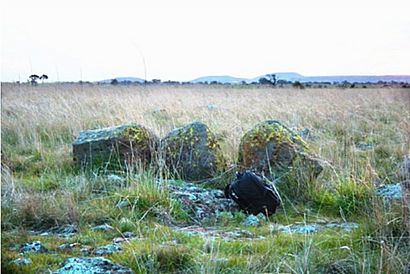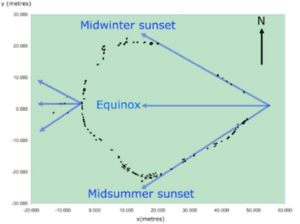Wurdi Youang facts for kids
Wurdi Youang is an amazing ancient stone arrangement in Australia. It's located near Little River, Victoria, close to a place called Mount Rothwell. This special site is owned by the Wathaurong Aboriginal Co-operative, which is an Indigenous Australian organization. It was given to them to help protect this important piece of history.
What is Wurdi Youang?
This stone arrangement looks like a big, irregular egg or oval shape. It's about 50 meters (164 feet) wide, stretching from east to west. The site is made up of about 100 basalt stones. These stones range from small rocks, about 200 millimeters (8 inches) across, to tall standing stones, about 1 meter (3 feet) high. All together, the stones weigh about 23 tonnes (25 short tons)!
At the western end of the circle, which is the highest point, there are three noticeable stones. These stones are about waist-high. People are not completely sure why the arrangement was built, how it was used, or exactly how old it is. However, many believe it was used for important ceremonies, like other stone arrangements in southeastern Australia.
The name Wurdi Youang comes from the Wada-wurrung language. It means "big hill." This was the original name for what is now called Station Peak or Flinders Peak. These are the tallest hills in the You Yangs range. The area around the stone arrangement was also known as the Parish of Wurdi Youang a long time ago. Today, the site is officially known as the "Mount Rothwell Stone Arrangement."
An Ancient Sky Watcher?
Scientists have found something very cool about Wurdi Youang. Some stones, located west of the main arrangement, line up perfectly with where the sun sets. They mark the setting sun's position during the equinoxes (when day and night are equal) and the solstices (the longest and shortest days of the year). Surveys show these alignments are very accurate!
Also, the straight sides of the arrangement, which spread out from its eastern end, also point to where the sun sets during the solstices. During the equinoxes, the sun sets right over the three special stones at the western end.
Because of these amazing alignments, some scientists think Wurdi Youang might be a very old observatory. An observatory is a place used to watch the sky and stars. Based on carbon dating from nearby areas, some suggest this stone arrangement could be as old as 11,000 years! If this is true, it would make Wurdi Youang the oldest astronomical observatory in the entire world. However, its exact age is still a mystery.



